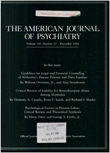Antithyroid antibodies in depressed patients
Abstract
The presence of antithyroid (antimicrosomal and antithyroglobulin) antibodies was assessed in 45 psychiatric inpatients with prominent depressive symptoms (28 with DSM-III major depression). Nine patients (20%) had detectable titers of antithyroid antibodies, a rate considerably higher than the 5%-10% observed in the normal population. Each of these nine patients with symptomless autoimmune thyroiditis had normal baseline serum thyrotropin concentrations and normal thyroid function (as assessed by T4, T3 uptake, and free thyroxine index). These findings support the hypothesis of subtle thyroid dysfunction in a sizable sample of psychiatric inpatients with prominent depressive symptoms.
Access content
To read the fulltext, please use one of the options below to sign in or purchase access.- Personal login
- Institutional Login
- Sign in via OpenAthens
- Register for access
-
Please login/register if you wish to pair your device and check access availability.
Not a subscriber?
PsychiatryOnline subscription options offer access to the DSM-5 library, books, journals, CME, and patient resources. This all-in-one virtual library provides psychiatrists and mental health professionals with key resources for diagnosis, treatment, research, and professional development.
Need more help? PsychiatryOnline Customer Service may be reached by emailing [email protected] or by calling 800-368-5777 (in the U.S.) or 703-907-7322 (outside the U.S.).



